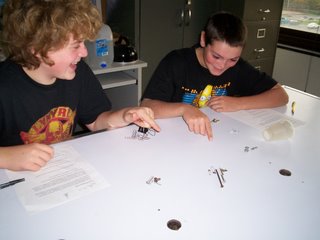 Today we got a closer look at some pond water from a local bog. Here DANA and CHRIS are in search of some Spirogyra. For the next couple weeks we will be doing some pretty cool microscope labs to look at the vast abundance of unicellular life around us.
Today we got a closer look at some pond water from a local bog. Here DANA and CHRIS are in search of some Spirogyra. For the next couple weeks we will be doing some pretty cool microscope labs to look at the vast abundance of unicellular life around us.
Welcome to the classroom blog of Mr. DeVoe - Here you will find photos, videos, class downloads, and other means to celebrate the community of Groton, biology, and environmental science.
31 October 2006
28 October 2006
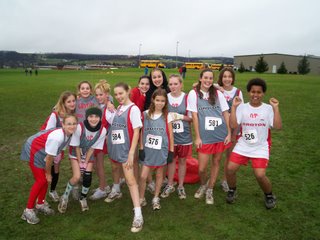
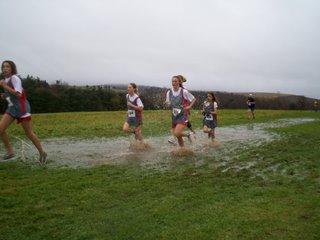
Saturday the Modified XC team came in 3rd overall at the (very muddy) IAC championship meet. Leading the way were SHYANNE W., ERICA S., ASHLEY M., HALLE S., and DANIELLE S. We had an awesome season and I hope to see each of you next year...when we come in 1st! Remember guys, I need everyone to hand in their washed warmups, uniform, and white T-shirt as soon as possible.
27 October 2006
 Today we had our microscope parts and safety quiz. Now that we got that out of the way we can focus on doing cool labs next week with pond water to see many of the cool protists we never get to see. REMEMBER: Your research papers are due Monday. Thanks to all that got them in early. I know we will have some winners. For more information on the contest see the Ithaca Sciencenter posting below.
Today we had our microscope parts and safety quiz. Now that we got that out of the way we can focus on doing cool labs next week with pond water to see many of the cool protists we never get to see. REMEMBER: Your research papers are due Monday. Thanks to all that got them in early. I know we will have some winners. For more information on the contest see the Ithaca Sciencenter posting below. Last night the modified girls soccer team suffered a tough loss to Ithaca even though I saw some great performances from the whole team.
Last night the modified girls soccer team suffered a tough loss to Ithaca even though I saw some great performances from the whole team.
26 October 2006
25 October 2006
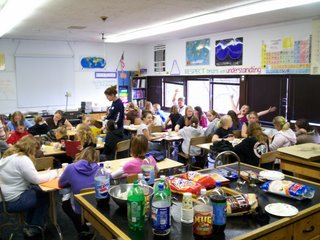 Today was the first 7th grade Tri-sci meeting of the year and about 35 girls showed up, which I thought was awesome. I hope everyone had fun and sticks with it. Our three main topics this year are forensic science, engineering, and marine biology. Make sure you get your permission slips tomorrow if you want to go on the first field trip to the Corning museum of glass. Only the first 40 7th and 8th graders that turn it in can go.
Today was the first 7th grade Tri-sci meeting of the year and about 35 girls showed up, which I thought was awesome. I hope everyone had fun and sticks with it. Our three main topics this year are forensic science, engineering, and marine biology. Make sure you get your permission slips tomorrow if you want to go on the first field trip to the Corning museum of glass. Only the first 40 7th and 8th graders that turn it in can go. Today in class we watched 2 short videos that hopefully made everyone think for a moment. It's easy to take things for granted in our "culture of excess" but also to think that our lives sometimes stink, without looking at the whole picture. For me, personally, these two videos left a huge impact. They can be viewed here and here.
24 October 2006

Today we spent the day in the library media center researching our topics for the Ithaca Sciencenter's "Science Minutes" competition. I saw a lot of cool topics that students have been researching ranging from "Why is fishing better near power plants?" to "Why do we dream?". Here, TASIA, NICOLE, JORDAN, and MARIE got right to work on theirs. Remember that these are due Monday and you must include your name, school address, grade, teacher, and title somewhere on your typed paper. If you need a pass for study hall or rec. make sure you see me.
21 October 2006
 Several Cross Country clowns celebrate after an impressive 4th place overall finish at Saturday's Marathon Invitational in the small-schools division. Results can be found here. Great Job everyone. Next Saturday is our championship meet at Marathon. Girls run at 11:15 and boys at 11:40. Come support us!
Several Cross Country clowns celebrate after an impressive 4th place overall finish at Saturday's Marathon Invitational in the small-schools division. Results can be found here. Great Job everyone. Next Saturday is our championship meet at Marathon. Girls run at 11:15 and boys at 11:40. Come support us!
19 October 2006
Looks like everyone did pretty well on their Taxonomy quizzes today. Perfect scores were achieved by KYLER G., JASON H., KYLE J., JORDAN T., and MARIE R. Way to go! There were also a few other standouts as RILEY S., KEEGAN B., CHRIS G., SHYANNE W., and JESSE S. performed very well. I was also glad to see that so many of you decided to turn in the "creature" dichotomous key extra credit. Last year I only had about 3 students do so. REMEMBER, you can hand those in up until the last day of the marking period.

Today after our taxonomy quiz we discussed a contest we are entering through the Ithaca science center. All students will receive a free family pass and each of the 15 area finalists will receive a $15 gift certificate for the gift shop. We will be in the library Tuesday to research a life science topic of our choice to write up for a 60 second radio broadcast. More details and past winners can be found here.Rules are as follows:
* The typed report is due 30 October 2006.
* Make the message 60 seconds long (around 150 words).
* Include your name, title of script, home or school address, grade, teacher, and school name.
* You can send in as many scripts as you like.
* Submissions become the property of the Sciencenter.
* Winning scripts will be posted on the Sciencenter web site. Only the first name, grade, and school district of winners will be posted.
17 October 2006
 Tonight the modified XC team participated in a very cold and rainy Whitney Point Invitational (at least we got out of school early). The girls team did great, finishing 8th out of 25 teams. Way to go girls. Saturday we have our last invitational of the year in Marathon. The following Saturday we have the IAC championships in Marathon and have a chance of winning our division if everyone does what they're capable of.
Tonight the modified XC team participated in a very cold and rainy Whitney Point Invitational (at least we got out of school early). The girls team did great, finishing 8th out of 25 teams. Way to go girls. Saturday we have our last invitational of the year in Marathon. The following Saturday we have the IAC championships in Marathon and have a chance of winning our division if everyone does what they're capable of.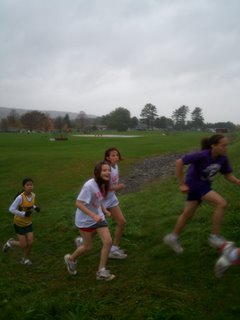 SHANIA and SIERRA forge their way up the big hill.
SHANIA and SIERRA forge their way up the big hill.
13 October 2006
WANT SOME EXTRA CREDIT? Well here is your task: Read the following excerpt by Peter Matthiessen. After you do, I want you to research this issue a bit further using the internet. I would like to know what the author is talking about, why this is such a big issue, the PROS of drilling for oil in this region, as well as the CONS. Your writeup should reflect topics in Life Science such as environmental ethics, wildlife conservaton, habitat, and what is best for your children. A good writeup of no less than 100 words will yield you at least 10 extra credit points. I want to hear opinions from the heart. I want students to show me that they care about more than just basketball, silly rumors, and stupid TV shows. Lets start with this...
"Wild northern Alaska is one of the last places on earth where a human being can kneel down and drink from a wild stream without being measurably more poisoned or polluted than before; its heart and essence is the Arctic National Wildlife Refuge (ANWR) in the remote northeast corner of the state, the earth's last sanctuary of the great Ice Age fauna that includes all three North American bears, gray wolves and wolverines, musk ox, moose, and, in the summer, the Porcupine River herd of caribou, 120,000 strong. Everywhere fly sandhill cranes and seabirds, myriad waterfowl and shorebirds, eagles, hawks, owls, shrikes and larks and longspurs, as well as a sprinkling of far-flung birds that migrate to the Arctic slope to breed and nest from every continent on earth. Yet we Americans, its caretakers, are still debating whether or not to destroy this precious place by turning it over to the oil industry for development."
The rest of the article can be found here. Please submit your response to me before the end of the marking period.
"Wild northern Alaska is one of the last places on earth where a human being can kneel down and drink from a wild stream without being measurably more poisoned or polluted than before; its heart and essence is the Arctic National Wildlife Refuge (ANWR) in the remote northeast corner of the state, the earth's last sanctuary of the great Ice Age fauna that includes all three North American bears, gray wolves and wolverines, musk ox, moose, and, in the summer, the Porcupine River herd of caribou, 120,000 strong. Everywhere fly sandhill cranes and seabirds, myriad waterfowl and shorebirds, eagles, hawks, owls, shrikes and larks and longspurs, as well as a sprinkling of far-flung birds that migrate to the Arctic slope to breed and nest from every continent on earth. Yet we Americans, its caretakers, are still debating whether or not to destroy this precious place by turning it over to the oil industry for development."
The rest of the article can be found here. Please submit your response to me before the end of the marking period.
10 October 2006
Today we had a great day out on Cayuga Lake. We studied the effects of land use in the Salmon Creek Watershed on water quality in the lake. We learned that farming and road salting in this area could potentially have harmful effects on the lake when things like pesticides, manure, soil, and salt make their way into the streams.

Here, the first group measures the average depth of a cross section of the stream. We calculated that Salmon Creek was discharging approximately 93 cubic feet/second into the lake. We learned that this stream accounts for about 12% of all water entering the lake.

At one station on the boat we drifted a net through the water to catch the plankton (tiny plant and animal-like organisms that live in the water).

Then we went inside the cabin to get a closer look under the compound light microscopes. Here, JORDAN and STEVEN get a good look at some diatoms and Daphnia.
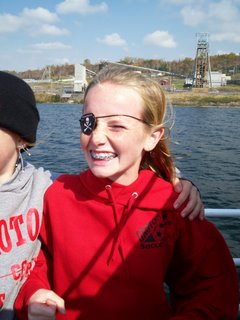 ARRRRRRR!
ARRRRRRR!

Here, the first group measures the average depth of a cross section of the stream. We calculated that Salmon Creek was discharging approximately 93 cubic feet/second into the lake. We learned that this stream accounts for about 12% of all water entering the lake.

At one station on the boat we drifted a net through the water to catch the plankton (tiny plant and animal-like organisms that live in the water).

Then we went inside the cabin to get a closer look under the compound light microscopes. Here, JORDAN and STEVEN get a good look at some diatoms and Daphnia.
 ARRRRRRR!
ARRRRRRR!
04 October 2006
03 October 2006
01 October 2006
 Saturday 14 October is Cornell University's Insectapalooza 2006. The event goes from 9am to 3pm in Comstock Hall. I encourage everyone to participate if you are looking for something interesting to do that day. Entomology (the study of insects) is one of my favorite areas of biology and I'm sure everyone will find it cool, also. If you go, you will receive extra credit. Just make sure you bring back proof that you went.
Saturday 14 October is Cornell University's Insectapalooza 2006. The event goes from 9am to 3pm in Comstock Hall. I encourage everyone to participate if you are looking for something interesting to do that day. Entomology (the study of insects) is one of my favorite areas of biology and I'm sure everyone will find it cool, also. If you go, you will receive extra credit. Just make sure you bring back proof that you went.
 Friday we talked a little about trans fat and how bad it is for us. Studies have shown that:
Friday we talked a little about trans fat and how bad it is for us. Studies have shown that: Trans fats cause significant and serious lowering of HDL (good) cholesterol and a significant and serious increase in LDL (bad) cholesterol; make the arteries more rigid; cause major clogging of arteries; cause insulin resistance; cause or contribute to type 2 diabetes; and cause or contribute to other serious health problems.After checking out this page make sure you check your nutrition labels.
Subscribe to:
Posts (Atom)


